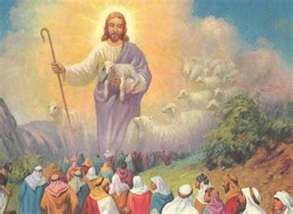26. And as it was in the days of Noah, so shall it be also in the days of the Son of man.
27. They did eat, they drank, they married wives, they were given in marriage, until the day that Noah entered into the ark, and the flood came, and destroyed them all.
28. Likewise also as it was in the days of Lot; they did eat, they drank, they bought, they sold, they planted, they built;
29. But the same day that Lot went out of Sodom it rained fire and brimstone from heaven, and destroyed them all.
30. Even thus shall it be in the day when the Son of man is revealed.
BEDE; The coming of our Lord, which He had compared to lightning flying swiftly across the heavens, He now likens to the days of Noah and Lot, when a sudden destruction came upon mankind.
CHRYS. For refusing to believe the words of warning they were suddenly visited with a real punishment from God; but their unbelief proceeded from self-indulgence, and softness of mind. For such as a man's wishes and inclinations are, will also be his expectations. Therefore it follows, they eat and drank.
AMBROSE; He rightly declares the deluge to have been caused by our sins, for God did not create evil, but our deservings found it out for themselves. Let it not however be supposed that marriages, or again meat and drink, are condemned, seeing that by the one succession is sustained, by the other nature, but moderation is to be sought for in all things. For whatsoever is more than this is of evil.
BEDE; Now Noah builds the ark mystically. The Lord builds His Church of Christ's faithful servants, by uniting them together in one, as smooth pieces of wood; and when it is perfectly finished, He enters it: as at the day of Judgment, He who ever dwells within His Church enlightens it with His visible presence. But while the ark is in building, the wicked flourish, when it is entered, they perish; as they who revile the saints in their warfare here, shall when they are crowned hereafter be smitten with eternal condemnation.
EUSEB. Having used the example of the deluge, that no one might expect a future deluge by water, our Lord cites, secondly, the example of Lot, to show the manner of the destruction of the wicked, namely, that the wrath of God would descend upon them by fire from heaven.
BEDE; Passing by the unutterable wickedness of the Sodomites, He mentions only those which may be thought trifling offenses, or none at all; that you may understand how fearfully unlawful pleasures are punished, when lawful pleasures taken to excess receive for their reward fire and brimstone.
EUSEB. He does not say that fire came down from heaven upon the wicked Sodomites before that Lot went out from them, just as the deluge did not swallow up the inhabitants of the earth before that Noah entered the ark; for as long as Noah and Lot dwelt with the wicked, God suspended His anger that they might not perish together with the sinners, but when He would destroy those, He withdrew the righteous. So also at the end of the world, the consummation shall not come before all the just are separated from the wicked.
BEDE; For He who in the mean time though we see Him not yet sees all things, shall then appear to judge all things. And He shall come especially at that time, when He shall see all who are forgetful of His judgments in bondage to this world.
THEOPHYL. For when Antichrist has come, then shall men become wanton, given up to abominable vices, as the Apostle says, Lovers of pleasure rather than lovers of God. For if Antichrist is the dwelling-place of every sin, what else will he then implant in the miserable race of men, but what belongs to himself. And this our Lord implies by the instances of the deluge and the people of Sodom.
BEDE; Now mystically, Lot, which is interpreted 'turning aside,' is the people of the elect, who, while in Sodom, i.e. among the wicked, live as strangers, to the utmost of their power turning aside from all their wicked ways. But when Lot went out, Sodom is destroyed, for at the end of the world, the angels shall go forth and sever the wicked from among the just, and cast them into a furnace of fire. The fire and brimstone, however, which He relates to have rained from heaven, does not signify the flame itself of everlasting punishment, but the sudden coming of that day.
31. In that day, he which shall be upon the housetop, and his stuff in the house, let him not come down to take it away: and he that is in the field, let him likewise not return back.
32. Remember Lot's wife.
33. Whosoever shall seek to save his life shall lose it, and whosoever shall lose his life shall preserve it.
AMBROSE; Because good men must needs on account of the wicked be sore vexed in this world, in order that they may receive a more plentiful reward in the world to come, they are here punished with certain remedies, as it is here said, In that day, &c. that is, if a man goes up to the top of his house and rises to the summit of the highest virtues, let him not fall back to the groveling business of this world.
AUG. For he is on the housetop who, departing from carnal things, breathes as it were the free air of a spiritual life. But the vessels in the house are the carnal senses, which many using to discover truth which is only taken in by the intellect, have entirely missed it. Let the spiritual man then beware, lest in the day of tribulation he again take pleasure in the carnal life which is fed by the bodily senses, and descend to take away this world's vessels. It follows, And he that is in the field, let him not return back; that is, He who labors in the Church, as Paul planting and Apollos watering, let him not look back upon the worldly prospects which he has renounced.
THEOPHYL. Matthew relates all these things to have been said by our Lord, with reference to the destruction of Jerusalem, that when the Romans came upon them, they who were on the housetop should not come down to take any thing, but fly at once, nor they that were in the field return home. And surely so it was at the taking of Jerusalem, and again will be at the coming of Antichrist, but much more at the completion of all things, when that intolerable destruction shall come.
EUSEB. He hereby implies that a persecution will come from the son of perdition upon Christ's faithful. By that day then He means the time previous to the end of the world, in which let not him who is flying return, nor care to lose his goods, lest he imitate Lot's wife, who when she deaf out of the city of Sodom, turning back, died, and became a pillar of salt.
AMBROSE; Because thus she looked behind, she lost the gift of her nature. For Satan is behind, behind also Sodom. Wherefore flee from intemperance, turn away from lust, for recollect, that he who turned not back to his old pursuits escaped, because he reached the mount; whereas she looking back to what was left behind, could not even by the aid of her husband reach the mount, but remained fixed.
AUG. Lot's wife represents those who in time of trouble look back and turn aside from the hope of the divine promise, and hence she was made a pillar of salt as a warning to men not to do likewise, and to season as it were their hearts, lest they become corrupt.
THEOPHYL. Next follows the promise, Whosoever shall seek, &c. as if he said, Let no man in the persecutions of Antichrist seek to secure his life, for he shall lose it, but whoso shall expose himself to trials and death shall be safe, never submitting himself to the tyrant from his love of life.
CYRIL; How a man may lose his own life to save it, St. Paul explains when he speaks of some who crucified their flesh with the affections and lusts, that is, with perseverance and devotion engaging in the conflict.
34. I tell you, in that night there shall be two men in one bed; the one shall be taken, and the other shall be left.
35. Two women shall be grinding together; the one shall be taken, and the other left.
36. Two men shall be in the field; the one shall be taken, and the other left.
37. And they answered and said to him, Where, Lord? And he said to them, Wheresoever the body is, thither will the eagles be gathered together.
BEDE; Our Lord had just before said, that he who is in the field must not return back; and lest this should seem to have been spoken of those only who would openly return from the field, that is, who would publicly deny their Lord, He goes on to show, that there are some who, while seeming to turn their face forward, are yet in their heart looking behind.
AMBROSE; He rightly says, night, for Antichrist is the hour of darkness, because he pours a dark cloud over the minds of men while he declares himself to be Christ. But Christ as lightning shines brightly, that we may be able to see in that night the glory of the resurrection.
AUG. Or He says, in that night, meaning in that tribulation.
THEOPHYL. Or He teaches us the suddenness of Christ's coming, which we are told will be in the night. And having said that the rich can scarcely be saved, He shows that not all the rich perish, nor all the poor are saved.
CYRIL; For by the two men in one bed, He seems to denote the rich who repose themselves in worldly pleasures, for a bed is a sign of rest. But not all who abound in riches are wicked, but if one is good and elect in the faith, he will be taken, but another who is not so will be left. For when our Lord descends to judgment, He will send His Angels, who while they leave behind on the earth the rest to suffer punishment, will bring the holy and righteous men to Him; according to the Apostle's words, We shall be caught up together in the clouds to meet Christ in the air.
AMBROSE; Or out of the same bed of human infirmity, one is left, that is, rejected, another is taken up, that is, is caught to meet Christ in the air. By the two grinding together, he seems to imply the poor and the oppressed. To which belongs what follows. Two men shall be in the field, &c. For in these there is no slight difference. For some nobly bear up against the burden of poverty, leading a lowly but honest life, and these shall be taken up; but the others are very active in wickedness, and they shall be left. Or those grinding at the mill seem to represent such as seek nourishment from hidden sources, and from secret places draw forth things openly to view. And perhaps the world is a kind of corn mill, in which the soul is shut up as in a bodily prison. And in this corn mill either the synagogue or the soul exposed to sin, like the wheat, softened by grinding and spoilt by too great moisture, cannot separate the outward from the inner parts, and so is left because its flour dissatisfies. But the holy Church, or the soul which is not soiled by the stains of sin, which grinds such wheat as is ripened by the heat of the eternal sun, presents to God a good flour from the secret shrines of the heart. Who the two men in the field are we may discover if we consider, that there are two minds in us, one of the outer man which wastes away, the other of the inner man which is renewed by the Sacrament. These are then the laborers in the field, the one of which by diligence brings forth good fruit, the other by idleness loses that which he has. Or those who are compared we may interpret to be two nations, one of which being faithful is taken, the other being unfaithful is left.
AUG. Or there are three classes of men here represented. The first is composed of those who prefer their ease and quiet, and busy not themselves in secular or ecclesiastical concerns. And this quiet life of theirs is signified by the bed. The next class embraces those who being placed among the people are governed by teachers. And such he has described by the name of women, because it is best for them to be ruled by the advice of those who are set over them; and he has described these as grinding at the mill, because in their hands revolves the wheel and circle of temporal concerns. And with reference to these mattershe has represented them as grinding together, inasmuch as they give their services to the benefit of the Church. The third class are those who labor in the ministry of the Church as in the field of God. In each of these three classes then there are two sorts of men, of which the one abide in the Church and are taken up, the other fall away and are left.
AMBROSE; For God is not unjust that He should separate in His reward of their deserts men of like pursuits in life, and not differing in the quality of their actions. But the habit of living together does not equalize the merits of men, for not all accomplish what they attempt, but he only who shall persevere to the end shall be saved.
CYRIL; When He said that some should be taken up, the disciples not unprofitably inquire, 'Where, Lord?'
BEDE; Our Lord was asked two questions, where the good should be taken up, and where the bad left; He gave only one answer, and left the other to be understood, saying, Wherever the body is, thither will the eagles be gathered together.
CYRIL; As if He said, As when a dead body is thrown away, all the birds which feed on human flesh flock to it, so when the Son of man shall come, all the eagles, that is, the saints, shall haste to meet Him.
AMBROSE; For the souls of the righteous are likened to eagles, because they soar high and forsake the lower parts, and are said to live to a great age. Now concerning the body, we can have no doubt, and above all if we remember that Joseph received the body from Pilate. And do not you see the eagles around, the body are the women and Apostles gathered together around our Lord's sepulcher? Do not you see them then, When he shall come in the clouds, and every eye shall behold him? But the body is that of which it was said, My flesh is meat indeed; and around this body are the eagles which fly about on the wings of the Spirit, around it also eagles which believe that Christ has come in the flesh. And this body is the Church, in which by the grace of baptism we are renewed in the Spirit.
EUSEB. Or by the eagles feeding on the dead animals, he has here described the rulers of the world, and those who shall at that time persecute the saints of God, in whose power are left all those who are unworthy of being taken up, who are called the body or carcass. Or by the eagles are meant the avenging powers which shall fly about to torment the wicked. AUG. Now these things which Luke has given us in a different place from Matthew, he either relates by anticipation, so as to mention beforehand what was afterwards spoken by our Lord, or he means us to understand that they were twice uttered by Him.
Catena Aurea Luke 17




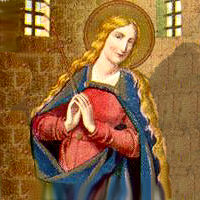
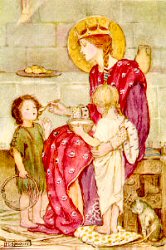 She was born in Hungary (1046), where her father was living in exile, and likewise spent her childhood there as an unusually devout and pious girl. In the course of time she went to England, when her father was called to high office in his fatherland by his uncle, King St. Edward III. Fortune, however, soon reversed itself again (Margaret's father died suddenly in 1057), and upon leaving England a mighty storm — or better, divine Providence — brought her to the shores of Scotland. Upon instructions from her mother, Margaret married Malcolm III, king of Scotland, in 1069. The country was blessed by her holy life and by her deeds of charity for the next thirty years. Her eight children she zealously trained in the practice of Christian virtues.
She was born in Hungary (1046), where her father was living in exile, and likewise spent her childhood there as an unusually devout and pious girl. In the course of time she went to England, when her father was called to high office in his fatherland by his uncle, King St. Edward III. Fortune, however, soon reversed itself again (Margaret's father died suddenly in 1057), and upon leaving England a mighty storm — or better, divine Providence — brought her to the shores of Scotland. Upon instructions from her mother, Margaret married Malcolm III, king of Scotland, in 1069. The country was blessed by her holy life and by her deeds of charity for the next thirty years. Her eight children she zealously trained in the practice of Christian virtues. 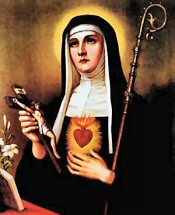 St. Gertrude the Great, a Cistercian nun, is one of the most lovable German saints from medieval times, and through her writings she will remain for all ages a guide to the interior life. She was born in 1256 at Eisleben and at the age of five taken to the convent at Rossdorf, where Gertrude of Hackeborn was abbess. Similarity in name has often occasioned confusion between the two Gertrudes. Our St. Gertrude never functioned as superior.
St. Gertrude the Great, a Cistercian nun, is one of the most lovable German saints from medieval times, and through her writings she will remain for all ages a guide to the interior life. She was born in 1256 at Eisleben and at the age of five taken to the convent at Rossdorf, where Gertrude of Hackeborn was abbess. Similarity in name has often occasioned confusion between the two Gertrudes. Our St. Gertrude never functioned as superior. 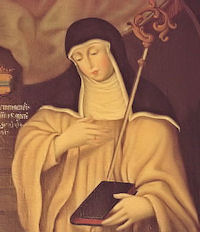 Born in the Castle of Helfa, near Eisleben, Saxony, to one of the noblest families of Thuringia, St Mechtilde, at 7, entered the Benedictine Convent at Rodensdorf – where her elder sister, Gertrude Hackeborn was already a nun. Under the tutelage of Gertrude, Mechtilde made rapid strides in virtue and learning. On account of her humility, piety and zeal she was appointed, when still relatively young, to direct the novitiate and the choir and as such she became the first teacher of St Gertrude the Great when the latter was placed in her convent at the age of 15.
Born in the Castle of Helfa, near Eisleben, Saxony, to one of the noblest families of Thuringia, St Mechtilde, at 7, entered the Benedictine Convent at Rodensdorf – where her elder sister, Gertrude Hackeborn was already a nun. Under the tutelage of Gertrude, Mechtilde made rapid strides in virtue and learning. On account of her humility, piety and zeal she was appointed, when still relatively young, to direct the novitiate and the choir and as such she became the first teacher of St Gertrude the Great when the latter was placed in her convent at the age of 15. 